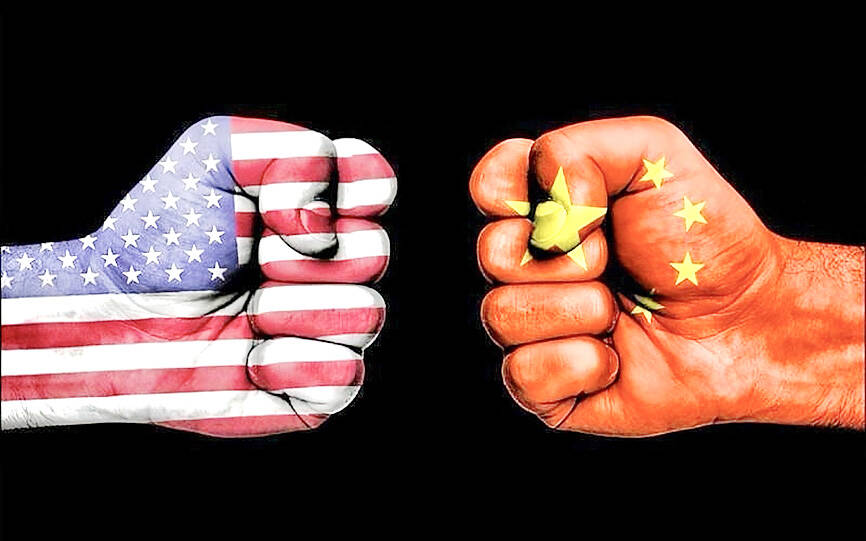Taiwan and other Asian countries could face steep US tariffs on electronics and semiconductors, as Washington seeks to pressure regional manufacturers into investing in the US and build its own domestic supply chains, market research firm Digitimes Inc (大椽股份) said yesterday.
As part of its broader strategy to boost its domestic manufacturing, the US is expected to use tariffs as leverage to bring Asian countries — including Taiwan — to the negotiating table and encourage their electronics suppliers to establish operations in the US, Digitimes vice president Eric Huang (黃逸平) said in a statement.
Washington’s focus extends beyond semiconductor makers in Taiwan and across Asia — including Japan, South Korea and Southeast Asian nations with electronics hubs — to the broader electronics supply chain, particularly key components such as flat panels, Huang said.

Photo: Bloomberg
Taiwan must prepare for potential US tariffs down the road, Huang said.
“We need to have semiconductors, we need to have chips and we need to have flat panels ... we need to have these things made in America. We can’t be reliant on Southeast Asia for all of the things that operate for us,” US Secretary of Commerce Howard Lutnick told ABC News’ This Week coanchor Jonathan Karl on Sunday.
In addition, US President Donald Trump on his Truth Social platform said that his administration would launch a national security tariff investigation focused on semiconductors and the broader electronics supply chain.
“We will not be held hostage by other countries, especially hostile trading nations like China,” he said.
Under growing pressure from Washington, the global electronics market is likely to fragment into three major blocs: the US, China and a third market comprising countries outside both, Huang said.
Amid escalating trade tensions between Washington and Beijing, electronics suppliers are expected to shift production either to the US or to countries with relatively low tariff exposure, while China would focus on developing its own electronic devices to serve the domestic market, he said.
In addition, as electronics makers ramp up investments in the US, they are likely to accelerate expansion in Mexico as well, drawn by tariff-free incentives under the United States-Mexico-Canada Agreement, he added.
In contrast, China is likely to continue encouraging technology suppliers to localize production within its borders, especially as it faces high tariffs and export controls from the US, he said, adding that foreign firms hoping to access the Chinese market would likely need to source components and carry out assembly domestically, he added.
China is expected to step up efforts to develop its own semiconductor ecosystem — particularly in artificial intelligence, electric vehicle applications and high-bandwidth memory chips — as part of a broader push to “de-Americanize” its supply chain and circumvent US restrictions, Huang said.
Conversely, the US would pursue its own strategy of desinicization to reduce reliance on Chinese technologies, he said.

Real estate agent and property developer JSL Construction & Development Co (愛山林) led the average compensation rankings among companies listed on the Taiwan Stock Exchange (TWSE) last year, while contract chipmaker Taiwan Semiconductor Manufacturing Co (TSMC, 台積電) finished 14th. JSL Construction paid its employees total average compensation of NT$4.78 million (US$159,701), down 13.5 percent from a year earlier, but still ahead of the most profitable listed tech giants, including TSMC, TWSE data showed. Last year, the average compensation (which includes salary, overtime, bonuses and allowances) paid by TSMC rose 21.6 percent to reach about NT$3.33 million, lifting its ranking by 10 notches

Popular vape brands such as Geek Bar might get more expensive in the US — if you can find them at all. Shipments of vapes from China to the US ground to a near halt last month from a year ago, official data showed, hit by US President Donald Trump’s tariffs and a crackdown on unauthorized e-cigarettes in the world’s biggest market for smoking alternatives. That includes Geek Bar, a brand of flavored vapes that is not authorized to sell in the US, but which had been widely available due to porous import controls. One retailer, who asked not to be named, because

SEASONAL WEAKNESS: The combined revenue of the top 10 foundries fell 5.4%, but rush orders and China’s subsidies partially offset slowing demand Taiwan Semiconductor Manufacturing Co (TSMC, 台積電) further solidified its dominance in the global wafer foundry business in the first quarter of this year, remaining far ahead of its closest rival, Samsung Electronics Co, TrendForce Corp (集邦科技) said yesterday. TSMC posted US$25.52 billion in sales in the January-to-March period, down 5 percent from the previous quarter, but its market share rose from 67.1 percent the previous quarter to 67.6 percent, TrendForce said in a report. While smartphone-related wafer shipments declined in the first quarter due to seasonal factors, solid demand for artificial intelligence (AI) and high-performance computing (HPC) devices and urgent TV-related orders

MINERAL DIPLOMACY: The Chinese commerce ministry said it approved applications for the export of rare earths in a move that could help ease US-China trade tensions Chinese Vice Premier He Lifeng (何立峰) is today to meet a US delegation for talks in the UK, Beijing announced on Saturday amid a fragile truce in the trade dispute between the two powers. He is to visit the UK from yesterday to Friday at the invitation of the British government, the Chinese Ministry of Foreign Affairs said in a statement. He and US representatives are to cochair the first meeting of the US-China economic and trade consultation mechanism, it said. US President Donald Trump on Friday announced that a new round of trade talks with China would start in London beginning today,